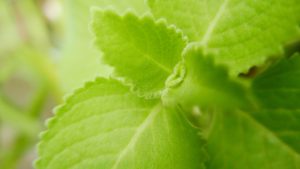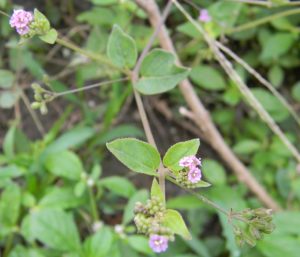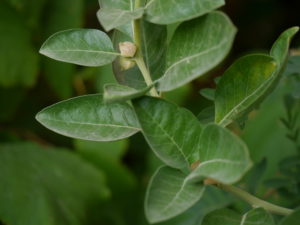
Two Healing Herbs – Punarnava & Ashwagandha
Although there are plentiful natural herbs that are immensely valuable as well as supportive so as to enhance the natural and innate wellness, let us here relate to two such Natural Healers – Punarnava and Ashwagandha.
These two herbs are rightly termed as healers as they hold superb remedial properties that have been bestowed upon us by Mother Nature.
- Of these two valuable herbs, Punarnava tends to renew and revitalize the body systems.
- The herb of Ashwagandha confers anti-ageing and immunity boosting merits.
Punarnava

Derived from two Hindi words ‘Punar’ which means again and ‘nava’ is new. Therefore a herb that is said to renew the body systems and all the more rejuvenates as well as revives the body is called Punarnava. The Latin name of the herb is Boerhavia diffusa and in English it is called as ‘Spreading hogweed‘.
Appearance of the Herb
The herb of Punarnava is green and leafy, approximately 2 to 3 feet long. The leaves are fleshy, rounded and contain small hair like out growths. It bears flowers during the rainy season which are mostly white or pink in colour. The root is hard, thick and somewhat whitish in colour.
Basic Properties of the Herb
Punarnava is sweet, pungent and astringent in taste and the after taste is also sweet. It is light and rough by nature and hot in action. Chemically, the main component is an alkaloid called Punarnavine.
Part of the Herb Used
The root, seed and the entire herb are used for medicinal purposes.
Medicinal Benefits of Punarnava
1. Boon for The Liver
Did you know that the herb of Punarnava is actually Nature’s splendid gift for you as it is highly advantageous for the liver? This is because the natural herb of Punarnava is a natural toner for the liver. Know how this herb benefits –
- When the body has to fight an infection of any form, your liver is the vital organ that takes the entire stress.
- As a consequence, you would be generally fatigued and lethargic most of the time.
- And when this condition would continue for a long passage of time, the consequences could be more.
- Not only could you lose hunger and your power of digestion, but also the gentle radiance on your face.
- At this stage it is advisable to use Punarnava so as to restore your overall health, stamina and vitality.
How Punarnava Helps?
- The herb helps in a number of disorders of the liver such as hepatitis, jaundice, iron deficiency anaemia, anorexia and sluggish liver etc;
- Punarnava comes as the drug for liver diseases and is of choice for an Ayurvedic physician.
- Research has established that this herb reconditions the liver.
- It also purifies the blood
- And as well aids in increasing the basic haemoglobin of an individual.
- You can take the herb in the form of fresh juice extracted from Punarnava .
- Or the herb extract which is generally available in tablet or capsule form.
2. Improves Working Of The Kidneys
This herb is diuretic and helps to subside any swelling in the body. Alternatively, there are a number of medicinal preparations, for example Punarnava mandoor, Punarnavashtak, Punarnava asav etc which may be taken under the supervision of an Ayurveda expert. Other than this, the herb, being a natural diuretic, is quite useful in treating the diseases of the urinary tract like dysurea and formation of urinary stones.
3. Anti-oxidant Herb
Studies have revealed the herb to possess anti-oxidant properties. Not only this, the herb of Punarnava is also recommended as a natural immunity booster.
4. Natural Blood Purifier
Punarnava is believed to be useful in purifying the blood and also the gastric juices.
5. Combats Joint Pains and Oedema
The herb Punarnava comes to use extensively to combat a swelling anywhere in the body. For this, you can prepare a paste out of grinding the fresh herb. Then simply warm it and this may be applied over the affected parts. This helps to relieve both the oedema and pain, especially in case you are suffering from Arthritis.
6. Aphrodisiac Action
This herb is a good aphrodisiac as well as energy tonic. For this purpose, the seed powder of the herb may be taken in a dosage of 1 to 3 grams along with a glassful of milk once or twice a day;
7. Natural Detox Agent
Punarnava also has anti-toxicological properties. Therefore the herb may be used both externally, as well as internally, in case of sting by poisonous animals, insects and reptiles like snakes.
What Ayurveda Implies
According to Ayurvedic text, Punarnava is believed to subside all the three doshas or body humours i.e. Vata or the air, Pitta or the fire and Kapha or the phlegm. This quality of the herb owes to the specific properties that it contains. Being sweet, pungent and astringent in taste, it decreases an aggravated fire body humour. Also as the herb is hot in potency, it therefore tends to decrease the air and phlegm.
Dosage Recommendations
The juice extracted by crushing the fresh herb can be taken in a dose of 5 to 10 ml twice a day. Also, the powder of the seeds of Punarnava can be taken in a dosage of 1 to 3 grams approximately.
Ashwagandha

Another Ayurveda herb that is extremely beneficial in restoring as well as revitalizing the overall health of an individual is a herb called Ashwagandha. Not only this, this particular herb comes to use effectively for restoring the energy levels of an emaciated person and all the more significantly playing a substantial role in delaying the process of ageing. In the Ayurvedic texts, the herb of Ashwagandha is quite rightly regarded as a Rasayana.
Why Ashwagandha Is A Rasayana?
Evidently, All the natural herbs that help in increasing resistance against disease, enhancing physical as well as mental health and also aid in delaying the debility of ageing; are mainly termed as Rasayanas. The herb of Ashwagandha has the benefit of being entitled as Rasayana, owing to the exceptional properties it holds.
What Is A Rasayana?
- Rasayana is a particular wellness therapy that occupies a prime position in Ayurveda.
- It abides as a distinctive branch that deals with maintaining and ameliorating the body functions, including those of the brain.
- The word Rasayana is made up of two words: ‘Rasa’ which means humour of the body and ‘ayana’ that is a source.
- Rasayana is therefore regarded as the source of all the body humours.
The Herb Of Ashwagandha
The Latin name of the herb is Withania somnifera and locally in India it is known as Asgandh. The Sanskrit name Ashwagandha is derived from two words ‘Ashwa’ and ‘Gandha’, the combination of the two means that what smells like a horse.
How Does It Look Like?
Ashwagandha, the medicinal herb, which grows 2 to 5 feet tall and bears yellowish-green flowers, is found more extensively in India in the regions of Himalayas. The root which is the part of the herb that is used for medicinal purposes is whitish-brown in colour, thick and sturdy and may extend to about 1 to 2 feet in length.
Part Of Herb Used
The root of Ashwagandha is mainly used for therapeutic purposes.
Medicinal Value
Ashwagandha is light and slimy by nature and hot in potency. The taste is a combination of sweet, bitter and pungent and the after taste is sweet. Chemical composition of the herb includes glycosides, acid, starch, sugars and amino acids. Other than these, approximately thirteen alkaloids like trophine, anapherine, anahygrine etc supplement the composition.
Ayurveda Claims
- Being slimy and hot by nature, the herb of Ashwagandha tends to cause a decrease in the Vata dosha or air body humor.
- Also, due to the same reason, it lessens down the Kapha or the phlegm humour of the body.
- Thus, it is useful in treating the ailments arising from a distortion in either of the two doshas or the body humours.
Therapeutic Benefits Of Ashwagandha

Energy Restorative Conduct
A powder prepared by pounding the roots of Ashwagandha may be taken in a dose of 3 to 6 grams along with a glass of warm and sweetened cow’s milk.
How You Can Take this?
- You could be taking this energy tonic regularly for some time is sure to boost the energy levels.
- This herb is also the drug of choice in case of weak and under-weight individuals.
- Ayurveda practitioners generally prescribe Ayurvedic preparation by the name of ‘Ashwagandharishta’.
Cure for Insomnia
The herb of Ashwagandha is soothing and calming for the brain. It is recommended in a number of ailments that arise due to the mal-functioning of this vital organ. It has proved to be positively beneficial as a ‘brain tonic’ and in the troublesome ailment of loss of sleep.
Try this Home Remedy –
- Prepare about 5 grams of the powder of Ashwagandha by pounding the roots of the herb.
- To this, you need to add half glass milk and half glass water.
- Then cook the mixture on slow fire till the water evaporates.
- After this, you can remove from fire, add sugar or mishri (crystalline sugar) and make into a tasty and swweetened drink.
- Take it warm just before retiring to bed.
For Urinary Disorders
Ashwagandha is a natural diuretic. The herb is therefore useful in the malady of diminished urination. An alkaloid formulation of the same is available in the market by the name of ‘Ashwagandha kshar’. 1 to 2 grams is the suggested dosage to be taken along with lots of water.
For Joint Stiffness And Pain
For those suffering from the chronic ailments of joint pains like rheumatoid arthritis, osteo-arthritis, gout etc, the recommended dose of the powder of the herb is to be taken along with warm water after meals.
In winters or in cold climates, externally a local massage of mustard or sesame seed oil along with the pounded root of Ashwagandha powder added to it proves beneficial.
Boon For Women
The herb of Ashwagandha may be found favourable in some of the women ailments such as –
- vaginal itch
- inflammation
- swelling in the uterus
- leucorrhoea or white discharge
- loss of hunger
- lethargy.
The medicinal preparations of Ashwagandha may be taken, or simply pound the root and take the same mixed into honey or ghee (Clarified butter).
This also acts as a natural aphrodisiac.
Dosage Recommendations
Powder is prepared by pounding the root may be taken in a dose of 3 to 6 grams approx. along with warm milk or water.
Sources of Information
1. The Ayurvedic Pharmacopoeia of India.
2. Dravyaguna vijnana by Prof. PV Sharma.
3. Charaka Samhita of Agnivesh by Vaidya Sri Satya Narayan Shastri.
Watch Video: How To Detox With Ayurveda Tips HD
About the Author:
Dr Sonica Krishan is Author and Speaker in the areas of Healthy and Joyous Living through Ayurveda, Meditation, Yoga and other Contemplative practices. She is a leading Ayurveda Professional in India. She is also Health Writer, Columnist, Editor, Ayurveda Consultant and Holistic Healing Coach. Dr Sonica is open for National as well as International Collaborations with interested people / institutions in fields of Ayurveda, Meditation and Yoga.
Dr Sonica Krishan’s Books are available at Amazon
Related Blogs:
Ayurveda Herbs And Home Remedies For Urticaria Skin Allergy
Grape Seed Extract – Amazing Multiple Health Benefits
